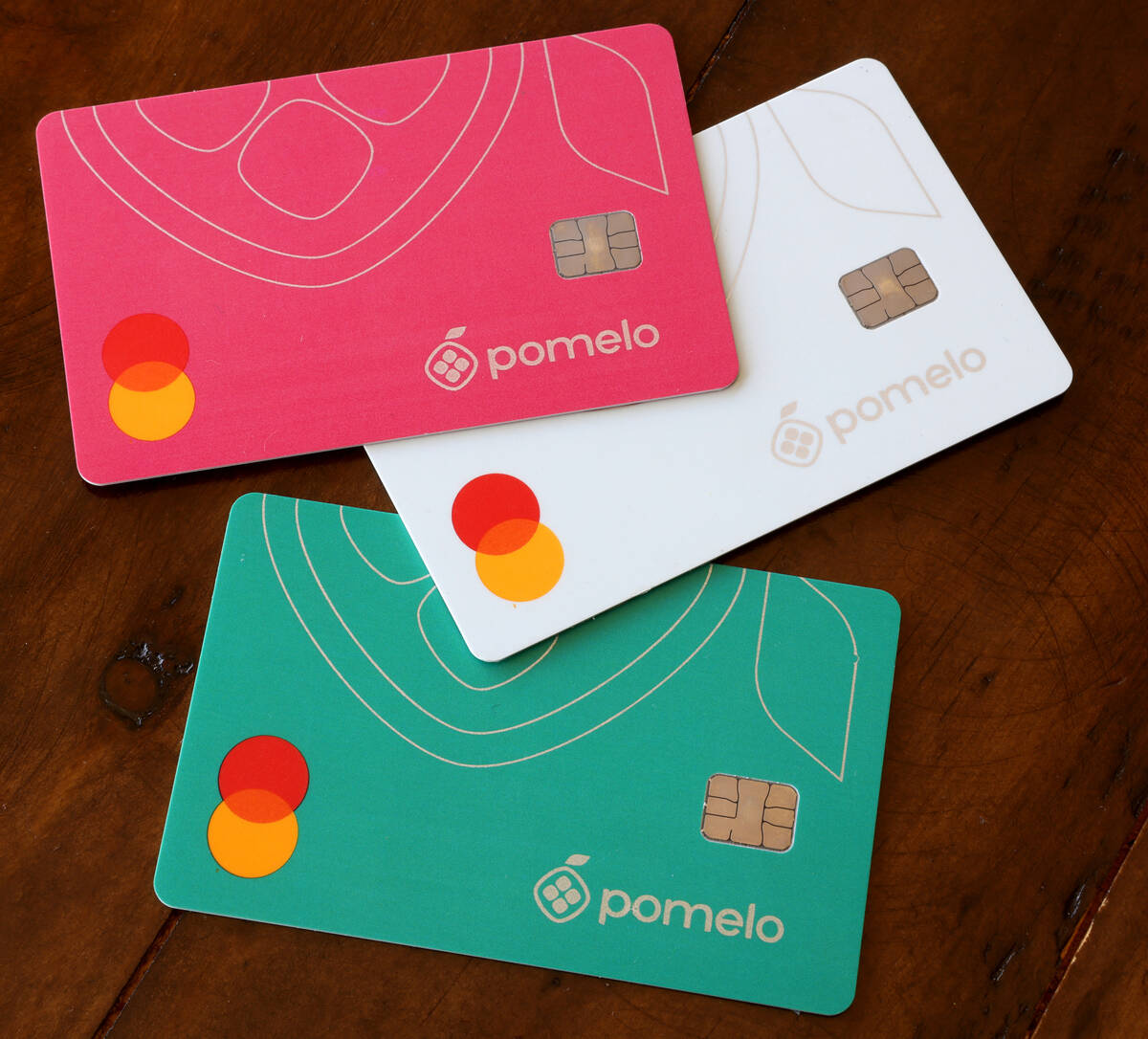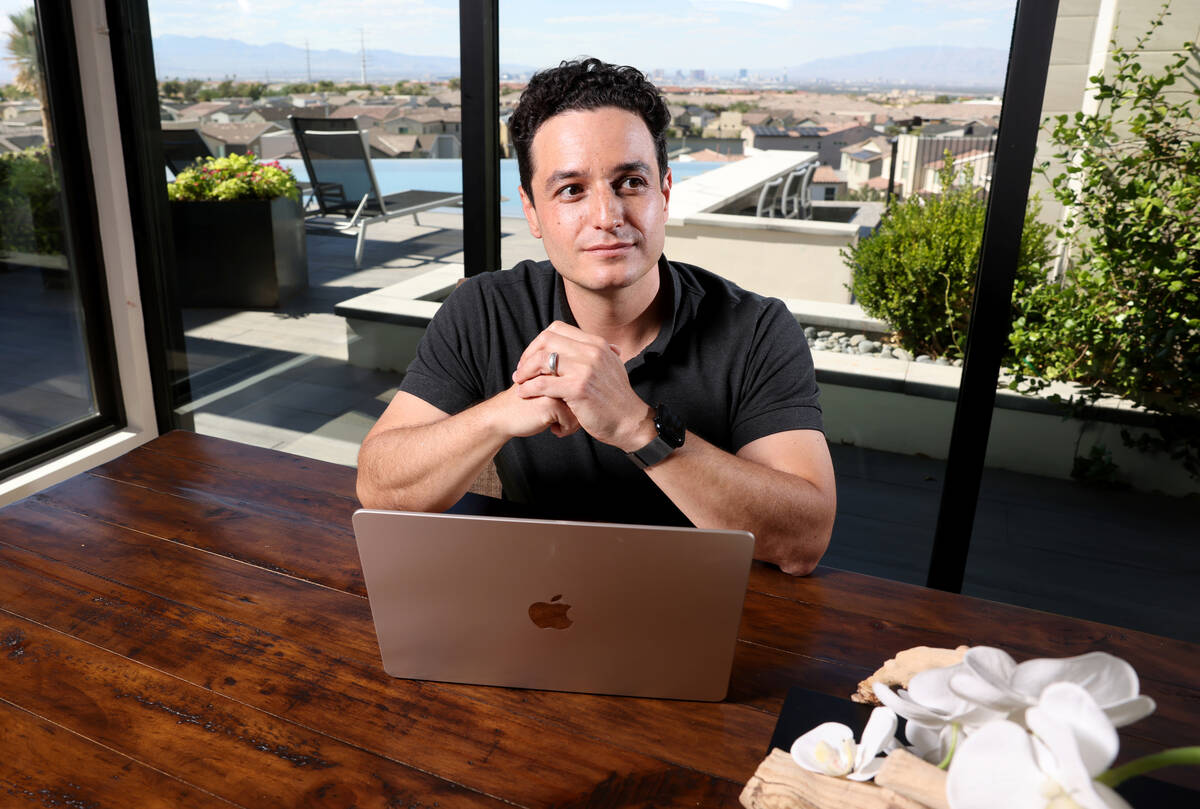Vegas-based startup aims to make sending money abroad easier
Sending money to family members living abroad can be costly and stressful, but one Las Vegas-based startup hopes to change that experience.
Founded by CEO Eric Velasquez Frenkiel, Pomelo offers its customers a credit card that can be used by friends or family members in other countries, making it easier to move money across borders in a faster and more secure way.
“Pomelo was founded at the very beginning of the pandemic to reinvent money transfer using credit instead of sending cash for the very first time,” said Velasquez Frenkiel.
Pomelo — named after the citrus fruit native to Southeast Asia — has been in beta testing this year but officially debuted its service last month and says it’s the first company to combine credit with money transfer. The company is partnered with Mastercard and is currently servicing the Philippines, though it plans to expand to other countries.
Pomelo launched as a way to address pain points that arise when U.S. residents attempt to send money to family members abroad — hefty fees and the risks involved with recipients picking up large sums of cash in person — but it’s also tapping into a lucrative market.
There’s a lot of value with global remittance flows, or cash sent to people in other countries. The market is expected to increase by 4.2 percent this year to $630 billion, according to the World Bank. It said on average the transfer fee is 6 percent when sending $200, as of the fourth quarter of 2021.
Creating an easier to way to transfer money could be huge for the world’s economy, says UNLV associate professor Hans Rawhouser, who thinks what Pomelo is doing is unique.
“There’s a lot of countries that are very dependent on remittances. It represents a large portion of their GDP,” said Rawhouser. “Particularly small countries that have a lot of people that emigrate to the United States.”
Christine Rockwell, a Las Vegas Asian Chamber of Commerce board member, said sending money to her extended family in the Philippines is often stressful and complicated. When her family does send money, they often pool the funds and send it in one large sum to avoid multiple fees.
But there’s still concern even after the funds are sent, she said, adding that the places where her family in the Philippines can receive the money are often targets for robbery.
“That place where usually money transfers happen … there’s a lot of security involved, and you think ‘I have to be careful,’” said Rockwell. “But with the cards, I think it just makes it easier. It’s something that we always thought of, ‘When we can use a card?’ … so this is, I think, truly groundbreaking.”
‘Personal mission’
Sending money to family is a process Velasquez Frenkiel knows well, and it’s the reason he launched the company.
Pomelo was meant to fix a “personal problem” that he noticed while preparing to move back to the U.S. from the Philippines during the pandemic.
“I thought to myself, ‘Well, I’m going back to the states to pay this credit card bill. Why can I just leave a card with my family (in the Philippines), instead of sending money every month through Western Union?” said Velasquez Frenkiel.
The Henderson resident said now “within about five minutes, someone can sign up (in the U.S.) and have someone buy something online in the Philippines.”
“That’s transformative,” he said.
If a person wants to send money overseas using Pomelo’s service, they can apply on the company’s website for a credit card. Depending on their credit history, the applicant may have to place a security deposit. The applicant can then add up to three authorized users who live overseas. The beneficiaries will receive a credit card within 10 days and the card can also be used online with the balance paid off monthly by the applicant.
Velasquez Frenkiel said Pomelo offers $1,000 worth of unsecured credit to its customers. An individual can also set spending limits on the card, which has no interest rate and acts as a charge card.
Pomelo’s transfer fees are no more than 1 percent because it passes off the costs to merchants instead of cardholders.
Velasquez Frenkiel said merchants are willing to pay the fees since it encourages faster checkouts, more e-commerce opportunities and fewer chances of fraud or theft that can come with businesses primarily relying on cash.
Rawhouser thinks moving the fees to merchants could be an “ingenious” idea if the merchants are willing to take on paying those fees.
Currently, only the credit card and online transfers are available to Pomelo customers but Velasquez Frenkiel said it could create a cash option such as ATM withdrawals in the future.
Raising funds
This isn’t the first time Velasquez Frenkiel founded a tech company. The former engineer at Meta Platforms Inc., formerly Facebook, cofounded the data platform SingleStore in 2011 then departed after seven years to focus on launching a consumer-focused company.
Pomelo announced last month that it raised $70 million in seed financing, with $20 million in equity financing and $50 million towards covering credit card balances, according to Velsaquez Freinkel.
Its funding round was led by Founders Fund General Partner Keith Rabois and Xoom Corp. cofounder and A* Capital General Partner Kevin Hartz with Afore Capital, Xfund, investor Josh Buckley, the Chainsmokers and singer Abel Tesfaye, also known as the Weeknd.
Pomelo is “off to a great start just with the set of funding that allows us to get to market with our Filipino corridor,” said Velsaquez Freinkel.
According to Rawhouser, Pomelo positioning itself as a new service could allow the company to be a leader in the field, but it could also create more competition.
“This is just adding to the market for credit card services in the Philippines,” said Rawhouser. “But I would imagine that other credit card companies would begin to copy … hopefully before that happens they’re able to build a brand and be seen as authentic, trying to solve a problem for migrants and their family back home.”
Velasquez Frenkiel said a big focus for Pomelo was to help immigrants build their credit scores in the U.S.
“For many of our customers, Pomelo is their very first credit card here … but also the very first card for their family overseas,” he said.
Building credit as an immigrant can be challenging, Rockwell said, who remembers when she moved to Las Vegas 20 years ago she couldn’t get a credit card from a major company.
“No one’s gonna give you a regular card,” she said. “And you just care about building credit, not necessarily what is the process, all I know is you have to open a credit card.”
Even though Pomelo is initially only serving the Philippines it still provides a large customer base. The Filipino community in the U.S. is more than 4 million people, and Las Vegas has the sixth-largest Filipino population in the country, according to the Pew Research Center.
Velasquez Frenkiel said it plans to expand to Mexico and India but it doesn’t have a set timeline.
“We are committed to growing Pomelo, at a healthy pace, but really looking to basically ensure that we can deliver value to the Filipino corridor before we look to expand into Mexico and India,” he said.
Contact Sean Hemmersmeier at shemmersmeier@reviewjournal.com. Follow @seanhemmers34 on Twitter.

































